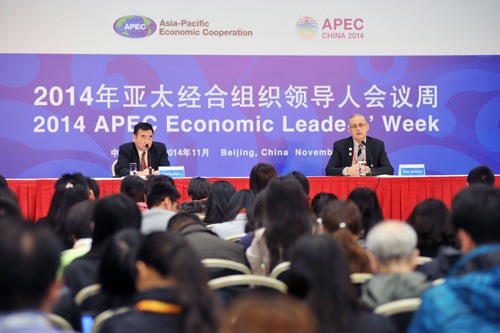|
 |
|
Dr. Denis Hew (left), Director of the APEC Policy Support Unit and Dr. Alan Bollard, Executive Director of the APEC Secretariat at a news briefing in Beijing on November 6 (WEI YAO) |
For the full coverage of APEC China 2014 please click here
The service sector will be a potential engine for growth in the Asia-Pacific region, said an APEC official on November 6.
GDP growth in the Asia-Pacific region for the first half of this year only expanded by 3.9 percent, down from the 4.3-percent growth rate in the second half of 2013, said Dr. Denis Hew, Director of the APEC Policy Support Unit, when releasing APEC's latest Economic Trends Analysis report at a news briefing in Beijing.
The slower growth happened in both advanced and developing economies in the region, due to a number of factors including gradual recovery of advanced economies, more subdued trade activities globally and domestic demand, said Hew.
In 2014, the APEC region's GDP is estimated to grow 3.9 percent, 0.1 percentage point lower than that in 2013.
Hew called the region's economic outlook "cautious optimism," because the U.S. economy will begin to recover strongly since its quantitative easing policy stopped in late October and developing economies also show signs of recovery. For 2015, the region is expected to grow at 4.3 percent.
Despite the cautiously optimistic outlook, it's important not to ignore some downside risks, Hew said. Many exports from APEC member economies go to industrialized economies, but the euro-zone economies remain fragile. U.S. economic growth still faces big pressure in continuing to be sustainable despite strong economic numbers.
"Within the region, Asia and China can't just depend just on exports to drive growth," Hew said. The report considers the service sector a potential engine for growth. Currently, the service sector accounts for 70 percent of APEC's output, and 46 percent of the region's employment is in the services sector.
Of the three main sectors of the APEC economy—agriculture, industry and services—services recorded the highest average annual growth rate between 1989 and 2009. During this period, APEC output grew by 83 percent, of which 60 percentage points can be attributed to the expanding services sector, according to the report.
"There's a pronounced interaction between service and manufacturing sectors…Services can be a powerful competitive advantage for companies. If a company is able to deliver goods faster, it has more competitive services than other companies," said Hew. "There are a lot of discussions about trying to move up the global value chain, and you find that services play a very important component."
" The service sector also plays an important role in boosting the weak domestic demand in the region," Hew continued.
Hew further pointed out that hi-tech industries and the knowledge-based service sector are still at a very early stage in many economies in the region. "There is a lot to be done by policy makers to see how much more of knowledge-based services can be promoted."
The report also says that APEC can play an important role in fostering the competitiveness of the services sector by promoting innovation. "Innovation can also help build competitive advantages for companies if they are able to create much more innovative services," said Hew. To boost innovation in the service sector, the report suggests APEC can reform the IPR system.
"A productive service sector also needs to see how to boost the supply of highly skilled workers in the region. That links to people-to-people connectivity," said Hew.
"Increasing people-to-people connectivity is high on our agenda, particularly facilitating the flow of labor and students across borders as well as ensuring skills and knowledge exchange. This will be critical to leveraging the rapidly evolving services sector in order to boost growth and incomes in the region," said Dr. Alan Bollard, Executive Director of the APEC Secretariat, at the briefing. | 